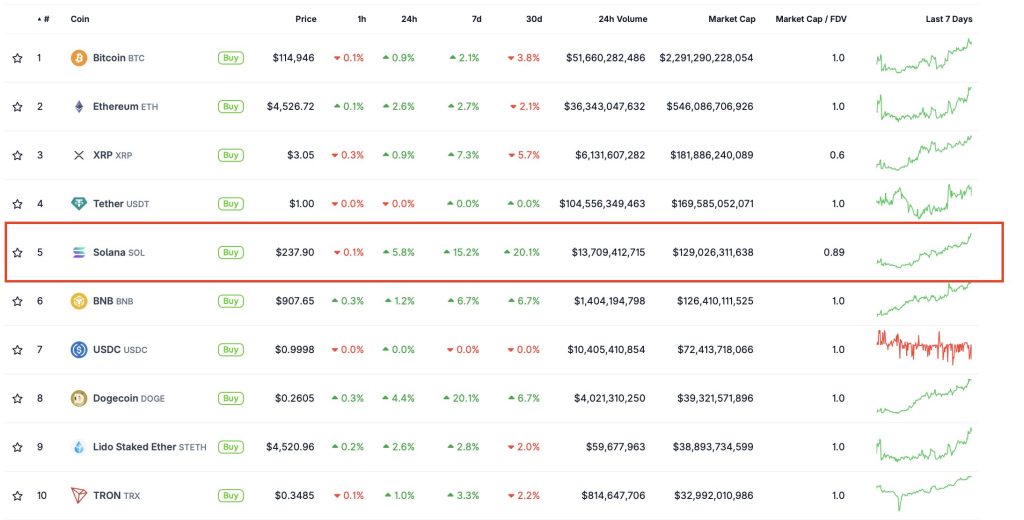Whales Flock to Solana: SOL Surges 20% While ETH Stagnates
Solana's native token SOL just ripped higher—soaring 20% as Ethereum struggles to keep pace. Are major investors finally ditching ETH for faster, cheaper chains?
Migration Patterns
Whale movements suggest capital rotation into Solana's ecosystem. The network's blistering transaction speeds and lower fees continue attracting institutional interest—while Ethereum's gas fees remain a punchline at crypto conferences.
Market Dynamics
Traders chase momentum where it lives. SOL's outperformance highlights a brutal truth in crypto: efficiency often beats legacy—even if that legacy basically invented the space. Meanwhile, traditional finance analysts still can't tell the difference between a blockchain and an Excel spreadsheet.
Future Implications
This isn't just about short-term gains. If Solana sustains this momentum, we might be witnessing a fundamental shift in where smart money deploys capital. The race for scalability just got real—and ETH's throne looks shakier by the day.
 Source: CoinGecko
Source: CoinGecko
Treasuries Start Stacking Solana
The crypto market is waiting for what many call an altcoin season, though experts keep warning it won’t look like the ones before. With far more projects in the mix this cycle, the idea that every token will rally feels unlikely.
Some analysts are betting on the Ethereum and Solana ecosystems. Bitcoin (BTC) dominance has dropped below 60%, often seen as a signal that it’s time for altcoins. Normally, ethereum price moves first, then other projects follow. But this time ETH has stalled, while SOL price pushed higher on its own.
There’s also been a shift in smart money flows. Earlier in the summer, large buyers were loading up on Ethereum. Now the focus has turned to Solana.
Galaxy Digital has bought $510,000,000 in $SOL this week.
Big money is betting on solana now. pic.twitter.com/hZ5lpVCIb0
Treasury holdings in Solana are also climbing, according to CoinGecko data. On Sep. 2, U.S.-based Sharps Technology added 2 million SOL to its balance sheet — worth about $476 million at current prices near $238.
ETF Flows Tell a Different Story
After SOL price started climbing in September, another trend became clear in the ETF data. ethereum spot ETFs recorded $788 million in outflows during Sep. 2–5. Each trading session closed in the red: −$135M, −$38M, −$167M, and −$447M on Friday.
Bitcoin spot ETFs, meanwhile, posted $250 million in inflows over the same period. The week opened strong (+$333M, +$301M) before turning negative in the last two sessions (−$223M, −$160M).
The flows show a clear divergence: institutions continue backing Bitcoin, while Ethereum is struggling to attract fresh demand. This pressure on ETH, paired with shifting capital flows, could make Solana look more attractive to some investors.
Ethereum Hits a Wall, SOL Price Moves Up and Meme coins Dominate
Over the past week, the Ethereum ecosystem has looked uneven. ETH price itself lost 2%, Uniswap (UNI) dropped 4%, while Aave (AAVE) barely moved. Gains came from tokens like Mantle (MNT), Ondo (ONDO), and Worldcoin (WRD). The picture shows selective growth — with Ethereum not setting the pace.
Solana, on the other hand, delivered broad gains. SOL price climbed more than 15%, while the ecosystem’s meme coins stole the spotlight. Pump.Fun (PUMP) surged 28%, Pudgy Penguins (PENGU) gained 27%, and Bonk (BONK) added 21%. Even dogwifhat (WIF), one of last cycle’s meme favorites, jumped 11%. The strong performance of community-driven tokens has made Solana the more dynamic ecosystem in early September.
SOL Price Growth Shows Promise, but Not Conviction
Capital has only recently started moving into Solana. Earlier in the summer, the absence of inflows was seen as a weakness. Now the trend is just beginning to form, with SOL price already up more than 20%.
The picture is not one-sided. Ethereum still anchors institutional money, and activity on Solana’s decentralized exchanges, its main strength, remains below earlier peaks. For now Solana looks like the faster mover, but whether this shift lasts will depend on continued inflows and stronger trader participation.
Everyone left the casino or lost it all
Insane chart pic.twitter.com/i6UIPoeIpI

